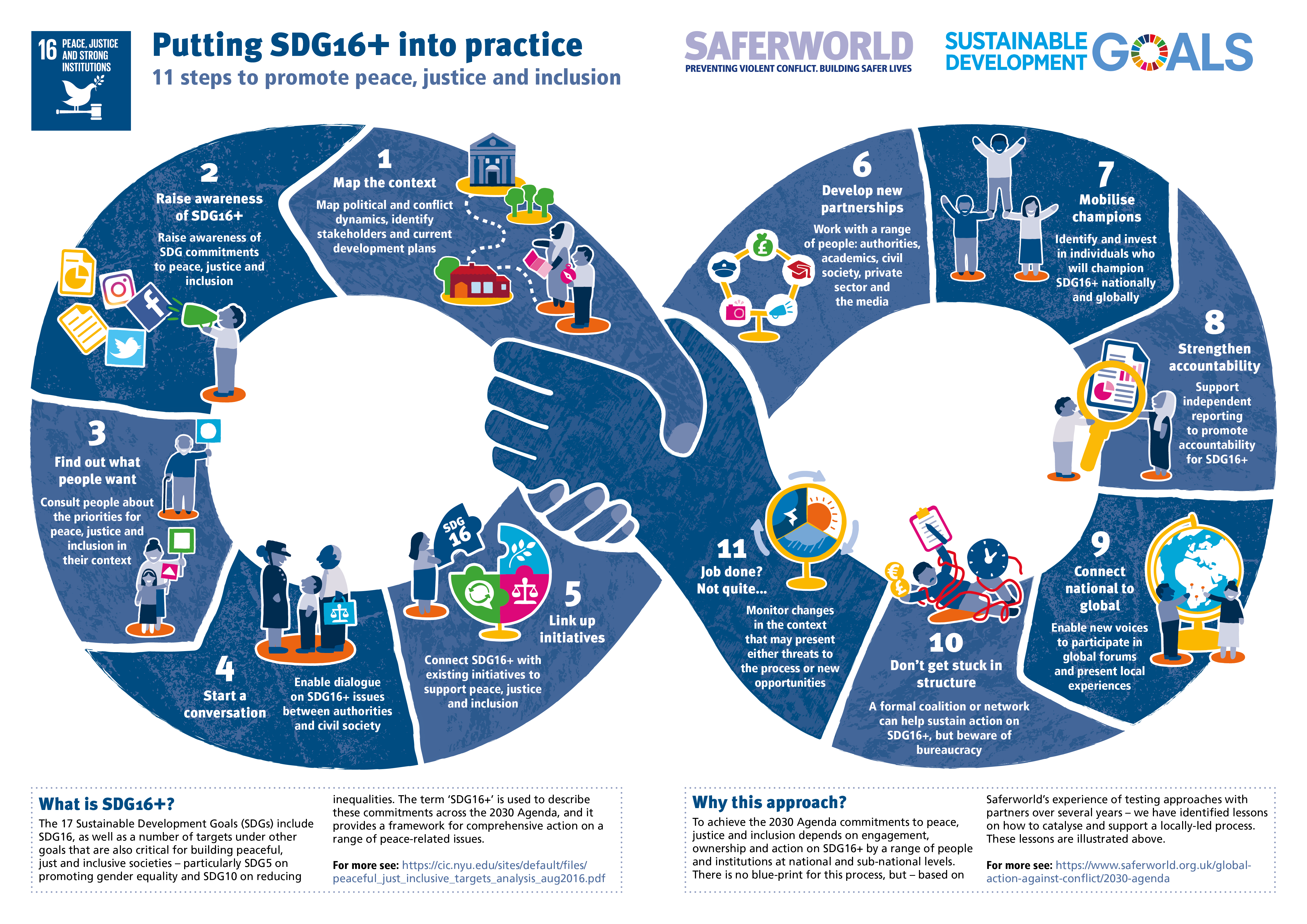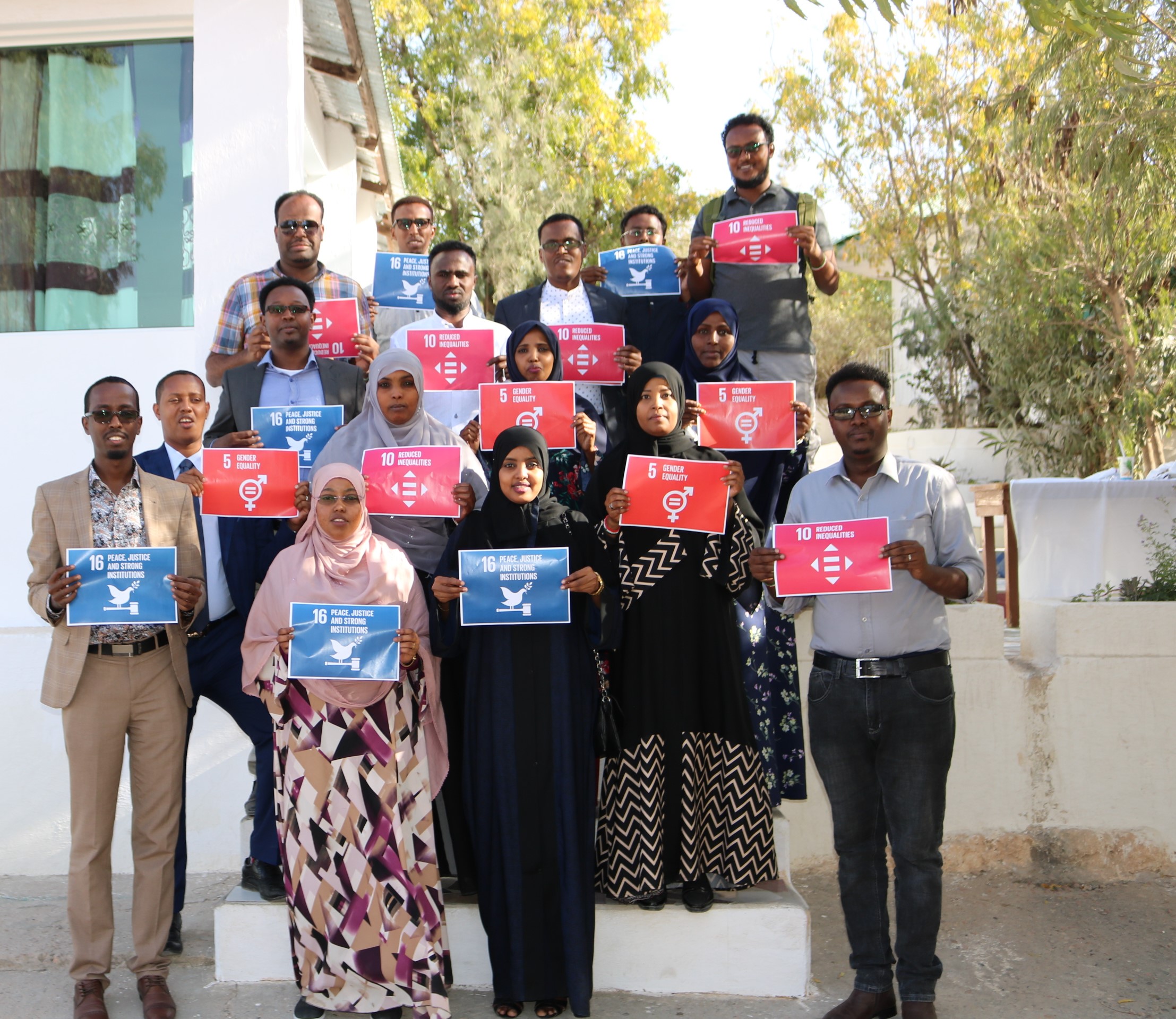Localising SDG16+: A Somaliland case study
Description
The commitments to build peaceful, just and inclusive societies found in the 2030 Agenda will only matter to people if they are relevant to their local reality and in some way owned, as opposed, to imposed. Since 2017, Saferworld has supported a process of localisation in Somaliland to try and make this a reality. This practise has 1) raised awareness of SDG16+ and wider 2030 Agenda 2) brought the 2030 Agenda to people and allowed them a say in priorities 3) integrated SDG16+ into national planning processes; 4) led to an inclusive, nationally owned strategy to take implementation efforts forward.
The overarching aim of Saferworld’s SDG16+ localisation programme is to ensure that the hard-won commitment to peaceful, just and inclusive societies enshrined in the 2030 Agenda actually brings about positive changes to people’s lives, especially those living in conflict-affected and fragile states. <br />
<br />
If the 2030 Agenda is to live up to its commitments, it must be relevant for citizens around the world. For this reason, Saferworld have focused on turning the agreement of the SDGs into action at a local and national level. This localisation process is aimed at catalysing national action on the 2030 Agenda to enable implementation to be far-reaching and not just business as usual. The entry point for localisation in contexts we work have been the elements of the 2030 Agenda that contribute to building peaceful, just and inclusive societies. These commitments, found in SDG16 predominantly, but also in SDG5, SDG10 and other SDGs, are often referred to as SDG16+. SDG16+ has been an entry point because central to a successful localisation process is the issue of inclusion - a central tenet to SDG16+. <br />
<br />
Over the past four years, Saferworld has worked with national civil society organisations in Somaliland as a pilot case to translate the commitments to peace, justice and inclusion in the 2030 Agenda into positive change in people’s lives. This approach is based on identifying and investing in local forces for peace, justice and inclusion – positive change-agents and innovative initiatives – and enabling them to use the SDG16+ framing and legitimacy to bring about change. <br />
<br />
This approach depends on first consulting with local stakeholders to understand how SDG16 can be ‘localised’, i.e. made relevant and useful in specific country contexts. elements to Saferworld’s approach, including: mapping key stakeholders in relation to peace, justice and inclusion; identifying SDG16 champions (in both government and civil society); understanding how SDG16+ targets relate to existing national plans and planning processes; translating key documents relating to the 2030 Agenda and SDG16+ into the local language(s); developing partnerships with national organisations, including civil society; widespread multi-sectoral consultation to identify national priorities for SDG16+; and reinforcing existing initiatives for peace, justice and inclusion as opposed to imposing a whole new framework.
The implementation of the project has followed a 10-step, non-linear process:
1) Mapping the context - Ensuring that the work complements the context, the project begun with a mapping of the political and conflict dynamics, stakeholders and national development plans that relate to SDG16+ targets
2) Defining commitments- Awareness raising of the global commitments made within the 2030 Agenda and within SDG16+ are an important early step. Linking this to ensure relevance and connecting with processes at national level helps contextualise this.
3) Creating a conversation- Support dialogue with and between authorities and diverse civil society and community groups fulfils an important obligation to ensure that 2030 Agenda implementation is based on partnerships.
4) Finding out what people want - the project then carried out inclusive consultations with people across Somaliland to find out what their SDG16+ priorities. After understanding what short-term and long-term priority issues were, the project helped civil society partners devise collective strategies to address these issues.
5) Partnering beyond the usual - After consultations and strategies for action have been developed, relevant authorities are engaged through a series of collaborative workshops to ensure coordination and collaboration. Further activities took place to broaden collaboration with media, academics and other civil society organisations
6) Linking up existing initiatives - Efforts were then made to ensure that SDG16+ work links with existing initiatives working to improve peace, justice and inclusion
7) Mobilising champions - through earlier project activities, there was a process of identifying individuals - from local or national authorities or non-state groups - who will champion SDG16+ issues nationally and globally. These individuals were supported to attend regional and global SDG events to showcase SDG16+ work in Somaliland and learn from other contexts and experiences.
8) Making commitments accountable- A process to support accurate reporting to official UN follow-up and review mechanisms (HLPF) has begun to promote accountable implementation of SDG16+ (a Somaliland CSO progress report is scheduled for release for the 2019 HLPF)
9) Making your work global - SDG16+ champions were supported to share national perspectives with global audiences and bring back learning from global policy forums to their national work
10) Formalising through a coalition - A formal coalition was set-up after two years of informal collaboration, to help sustain action on SDG16+. This light-touch structure is avoiding a bureaucratic structure, but will become a Somaliland owned platform to take forward implementation of SDG16+.
The organisations which now make up the Somaliland SDG16+ Coalition convened a series of consultations across Somaliland to discuss and identify civil society priorities for action on peace, justice, security, gender equality, inclusion and good governance – the main elements of SDG16+. The consultations with over 50 CSOs from across the six regions of Somaliland identified priority actions on SDG16+ over the short and long-term, which were published in a report and presented to the government (https://www.saferworld.org.uk/resources/publications/1173-building-a-pe…).
This approach has helped bring together previously disconnected Somaliland NGOs, which have now joined forces to advocate on SDG16+ priorities, including providing access to justice for all, ending FGM and increasing women’s political participation. This approach also stimulated authorities to undertake their own prioritisation process, given the far-ranging nature of the Somaliland National Development Plan II.
The Somaliland SDG16+ localisation approach has been held up as a best practise by donors, UN officials, INGOs and NGOs at the HLPF and other SDG16/2030 Agenda related processes.
Saferworld’s approach to enabling national action on SDG16+ has garnered growing attention in recent years. It is premised on the importance of adapting the global SDG16+ commitments to the national context, in terms of the language in which they are expressed, but also by identifying the priorities of national stakeholders, and by understanding how SDG16+ targets align with existing national plans. Saferworld is increasingly recognised as a pioneer in this area, and national and international partners have expressed interest in adapting this approach for other conflict-affected and fragile contexts. Based on our engagement in Somaliland, as well as consultations in several other regions, Saferworld has now developed an 11-step Guide for localising SDG16+ in conflict-affected contexts (https://www.saferworld.org.uk/multimedia/putting-sdg16-into-practice). <br />
<br />
This guide is not a one-size-fits-all blue-print or template: one of the first principles is that the process must be adapted to the particular political and security context in which you are operating viz. Saferworld’s very different approach in Somaliland to other contexts. Nevertheless, there are a number of common elements to Saferworld’s approach, including: mapping key stakeholders in relation to peace, justice and inclusion; identifying SDG16 champions (in both government and civil society); understanding how SDG16+ targets relate to existing national plans and planning processes; translating key documents relating to the 2030 Agenda and SDG16+ into the local language(s); developing partnerships with national organisations, including civil society; widespread multi-sectoral consultation to identify national priorities for SDG16+; building on and reinforcing existing initiatives for peace, justice and inclusion as opposed to imposing a whole new framework.<br />
<br />
At the same time, it is essential that national action on SDG16+ is linked up at the regional and global levels. A common regional approach will strengthen the hand of SDG16+ champions in individual countries, as well as fostering cross-learning from comparative experiences. Equally important is connecting national experiences on SDG16+ to the global process. Unless the SDGs are grounded in the experiences of those living in situations of conflict and insecurity, and take account of the constraints they operate under, achieving the 2030 Agenda is a distant prospect.
https://www.saferworld.org.uk/resources/publications/1129-peaceful-just…
https://www.saferworld.org.uk/multimedia/putting-sdg16-into-practice
https://www.saferworld.org.uk/resources/publications/1173-building-a-pe…
https://www.saferworld.org.uk/resources/publications/1201-enhancing-acc…
SDGS & Targets
Deliverables & Timeline
Resources mobilized
Partnership Progress
| Name | Description |
|---|
Feedback
Action Network


Timeline
Entity
Region
- Africa
Geographical coverage
Photos


Website/More information
Countries

Contact Information
Jordan Street, Policy and Advocacy Adviser
